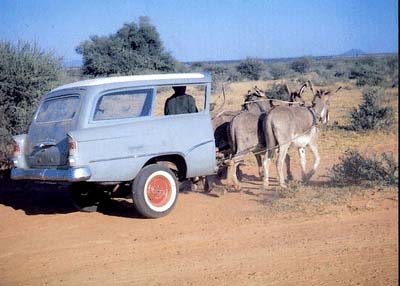Beyond Petroleum
The era of declining fossil fuel consumption

 A
world without abundant and cheap energy is not the future that most
Americans imagine, but it is a fact. Bigger and more powerful automobiles,
faster air travel, bigger homes, etc. are what most Americans expect the
future to bring. None of these things are possible without abundant and
cheap oil and natural gas. Some predict a very bleak future. [1][2] A
world without abundant and cheap energy is not the future that most
Americans imagine, but it is a fact. Bigger and more powerful automobiles,
faster air travel, bigger homes, etc. are what most Americans expect the
future to bring. None of these things are possible without abundant and
cheap oil and natural gas. Some predict a very bleak future. [1][2]
This is a world wide problem. All countries will be
affected and cooperation between them is a paramount necessity. However,
the United States is the biggest consumer of oil (on a per capita basis)
in the world and therefore the most dependent. If we do nothing, our
children will inherit a country with a nonfunctioning transport system. If
we do nothing, our children will be cold and hungry.
A reduction in energy consumption might be merely
inconvenient, or it might be a disaster. It depends on how the problem is addressed.
Without oil and gas, farmers can't produce food. Without oil, truckers
can't deliver food and people can't get to stores. Without gas and oil,
electricity production will be curtailed resulting in rolling blackouts
and outages. Without electricity, oil, and gas, people will not be able to
heat their homes.
The first step toward a long term solution is energy
conservation. This can be done immediately and no new technology needs to
be developed. Conservation buys time that can be used to develop a
transport system that does not use oil. Also, oil will be needed to build
the new transport system. Extreme energy conservation measures will be needed
to live with sustainable energy resources.
The Bush Administration certainly has access to oil
industry expertise and presumably they are aware of the oil depletion
problem. The Bush Administration National Energy Policy Development (NEPD)
report does address the problem to a small extent. This, for example, is
what it says about CAFE standards:
The NEPD Group recommends that the
President direct the Secretary of Transportation to:
-
Review and provide
recommendations on establishing Corporate Average Fuel Economy
(CAFE) standards with due consideration of the National Academy of
Sciences study to be released in July 2001. Responsibly crafted CAFE
standards should increase efficiency without negatively impacting
the U.S. automotive industry. The determination of future fuel
economy standards must therefore be addressed analytically and based
on sound science.
-
Consider passenger safety,
economic concerns, and disparate impact on the U.S. versus foreign
fleet of automobiles.
-
Look at other market-based
approaches to increasing the national average fuel economy of new
motor vehicles.
That could be interpreted to mean that
high-horsepower automobiles and SUVs will continue to be manufactured. The
automobile industry loves SUVs because they are highly profitable. CAFE
standards were put in place in 1975 in response to the OPEC oil embargo.
CAFE standards do not apply to SUVs because SUVs are considered to be
trucks, not automobiles. Industry lobbyists have succeeded in preserving
this loophole. The average mileage of all passenger vehicles has actually
declined to 20.4 mpg, mainly because of the poor performance of SUVs.
The oil based transportation will have to be
replaced, but the problem is bigger than that. We use fossil fuel to heat
our homes and agriculture depends on oil and natural gas. It is urgent to
develop sustainable energy sources soon because it will be a very big job.
And it will be easier to do it while we still have oil.
Technological Solutions

 Many
Americans believe that technology can provide an energy source. It is more
likely that technology will be used to reduce energy consumption. A good
example of this is the Segway [6]
(here demonstrated by President Bush), an electrical device for personal
transportation. The same person stated that "We need an energy bill
that encourages consumption." [3]
He might be speaking for himself or the administration. Clearly, the Bush
administration does not regard conservation to be an urgent
matter. None of the democratic candidates are urging conservation very
strongly either. In fact, at this time (January 2004) very few politicians
of any stripe acknowledge the problem of the energy crisis. Many
Americans believe that technology can provide an energy source. It is more
likely that technology will be used to reduce energy consumption. A good
example of this is the Segway [6]
(here demonstrated by President Bush), an electrical device for personal
transportation. The same person stated that "We need an energy bill
that encourages consumption." [3]
He might be speaking for himself or the administration. Clearly, the Bush
administration does not regard conservation to be an urgent
matter. None of the democratic candidates are urging conservation very
strongly either. In fact, at this time (January 2004) very few politicians
of any stripe acknowledge the problem of the energy crisis.
Nuclear fusion is what powers the sun. It has been proposed as an energy source
on Earth. [4][5] Several nuclear fusion
reactions are possible. The fusion of helium 3 nuclei is of special interest because
no neutrons are produced. That means no radioactive waste products. One ton of
helium 3
is worth about 5 billion dollars in energy terms. Unfortunately, there is very
little helium 3 on Earth. It may be that the easiest place to get helium 3 is the the moon! There are other problems too. It seems crazy to
get energy from the moon, but professor Kulcinski makes a good case for
it.
Many energy sources will be available in the future.
These include solar, wind, geothermal, biomass, fusion, and nuclear. None
of these have the possibility to bring back the days of abundant and cheap
energy afforded by fossil fuel.

[1] http://dieoff.com/
"Petroleum geologists have known for 50 years that global oil
production would "peak" and begin its inevitable decline within
a decade of the year 2000. Moreover, no renewable energy systems have the
potential to generate more than a fraction of the power now being
generated by fossil fuels. In short, the transition to declining
energy availability signals a transition in civilization as we know
it."
[2] The Party's Over
by Richard Heinberg. Subtitled "Oil, War and the Fate of Industrial
Societies." Available at www.newsociety.com
The problem of oil depletion needs someone to sound the alarm and this
book may do it.
[3] Trenton, New Jersey, Sep. 23, 2002
[4] http://www.fusion.org.uk/index.html
"A simple guide to what Fusion Power is all about, why we need it,
and how we hope to achieve it."
[5] http://fti.neep.wisc.edu/neep602/lecture27.html
Professor G. L. Kulcinski's lecture entitled Helium Fusion: A
Safe, Clean, and Economical Energy Source For Future Generations.
[6] http://www.segway.com/
The Segway™ Human Transporter (HT) is the first of its kind—a
self-balancing, personal transportation device designed to go anywhere
people do. It gives people everywhere the ability to move faster and carry
more, allowing them to commute, shop, and run errands more efficiently
while also having fun. It makes businesses more productive by allowing
workers greater versatility, mobility and carrying capacity. It does it
all by harnessing some of the most advanced, thoroughly tested technology
ever created.
Dude, Where's My Country? -- by Michael
Moore. A very popular and frankly political book. But there is a chapter
about the era that comes after the oil is gone. It is presented as a
nightmare but it brushes against reality in many places.

|